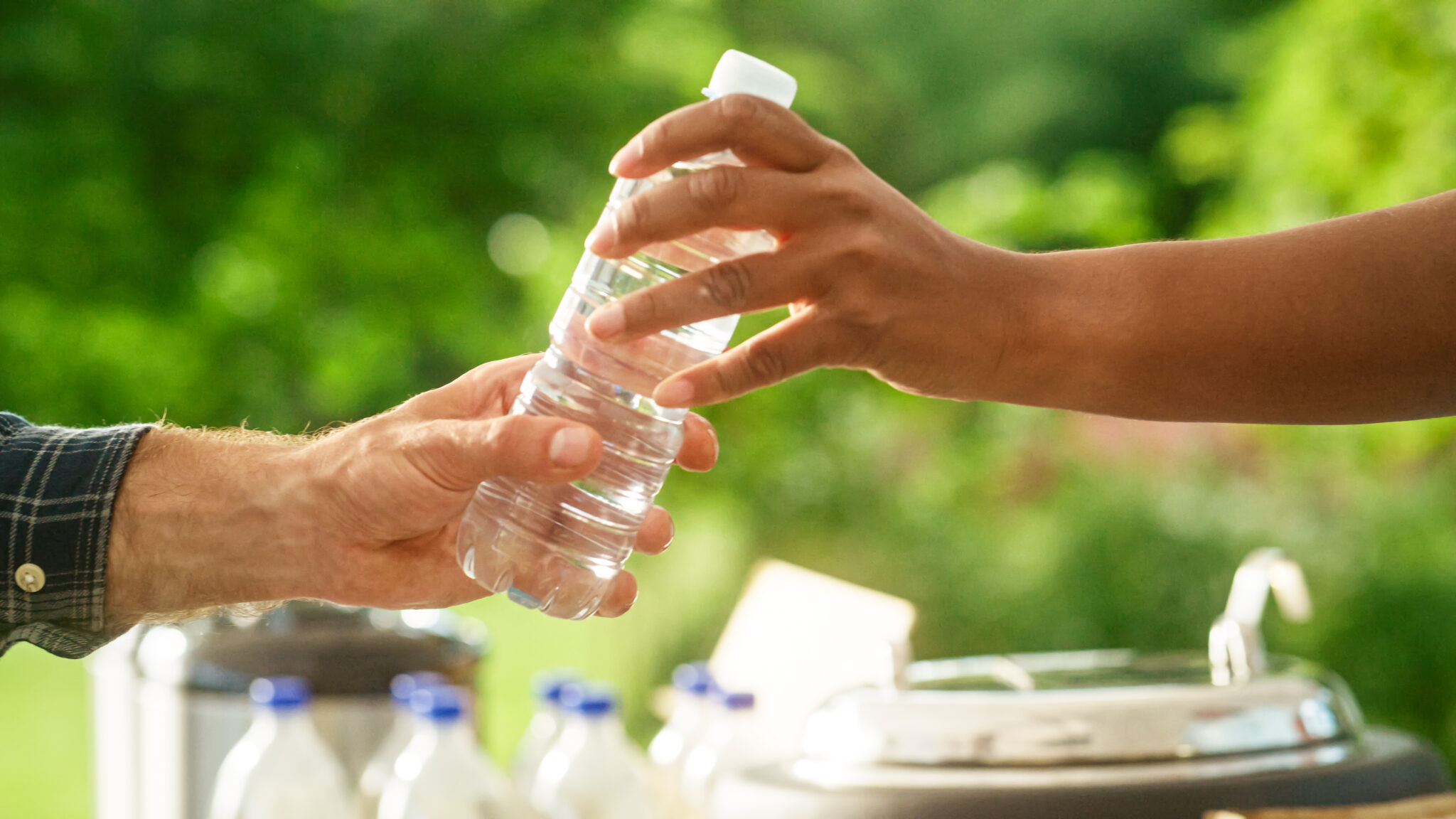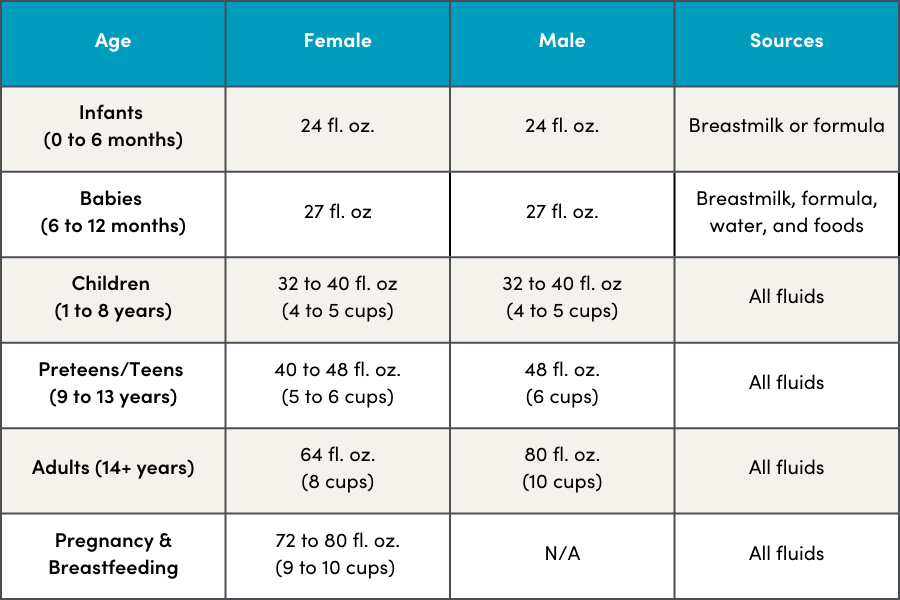Health/Wellness, Patient Blog | Jul 10 2023
Hydration: How much fluid do our bodies need?

Hydration is important for overall health and well-being. The body requires water for various functions including body temperature regulation, nutrient absorption, waste removal, joint lubrication, healthy skin, and cognitive health. Adequate hydration is necessary for us to live and survive. It may surprise you that many people ask the question, “How much water do we really need?”
Factors that affect fluid requirements
There are several factors that affect fluid requirements, including age, sex, body size and composition, activity level, and certain health conditions. Starting with age, as seen on the chart below, children have higher fluid needs relative to their body weight compared to adults. In adults older than 70, it may be harder for them to achieve their fluid requirements due to a decreased sensation of thirst and awareness to drink regularly.
As far as body size and composition, the bigger a person is, the higher their fluid requirements are. This also applies to those with increased muscle mass as more fluid is needed to maintain muscle compared to fat.
Activity level has the greatest impact on fluid needs. As physical activity increases in duration and intensity, the body loses large amounts of water through sweat. This process helps regulate body temperature to prevent overheating. Additional fluids are essential for body temperature regulation, and warm weather increases the demand for fluids as well.
Certain health conditions affect fluid needs too. Things like fever, diarrhea, and vomiting increase needs whereas conditions such as kidney heart, and liver disease may call for a reduction or restriction of fluids. Pregnancy and breastfeeding increase fluid needs to support growth and development of the baby and to produce breast milk. Even some medications and supplements can interfere with fluid balance and need to be considered closely when considering fluid needs for individuals who fit into these categories.
Fluid needs based on age

Fluid sources
Plain water is the most natural choice and the best fluid source in most situations, but there are alternatives when water is not an option or isn’t desired. In addition to plain water, beverages such as milk, decaffeinated tea, 100% fruit juice without added sugars, smoothies, soups, and broth are all considered hydrating fluids. Water-rich fruits and vegetables such as watermelon, oranges, strawberries, grapes, cucumbers, lettuce, zucchini, and tomatoes can also contribute to daily fluid goals.
Sports drinks and electrolytes are reserved for use when intense physical activity is taking place or excessive sweating has occurred due to prolonged activity or time spent in hot climates. These beverages are often high in sugar and sodium, which are not needed in most situations.
Signs of dehydration
Inadequate fluid intake can lead to dehydration, and recognizing the signs can help identify this condition before it becomes dangerous. Be aware that mild thirst is often the first sign that you need fluids. Additional signs of dehydration include the following:
- Dry mouth/lips
- Headaches
- Dark and decreased urine
- Dry skin
- Fatigue/weakness
- Muscle cramps
- Dizziness/lightheadedness
- Increased heart rate
Tips to stay hydrated
Drinking enough fluids can be challenging for some people, but staying hydrated is essential to maintaining overall good health. Often, these helpful tips can ensure adequate hydration is achieved daily.
- Drink with meals
- Eat foods with high water content
- Carry a water bottle
- Add sugar-free flavoring to water
- Limit caffeine and alcohol
- Drink before you are thirsty
- Monitor urine color
- Replenish fluids before, during and after physical activity
Summary:
Prioritizing hydration and establishing good habits when it comes to consuming adequate fluids will keep your body functioning optimally. Water is a vital component of our bodies and necessary for overall health and wellbeing. Be aware of how much fluid you require and pay close attention to any signs of dehydration that arise in order to stay healthy during warmer months and all year long.
If you have more questions about your diet, it’s always a great idea to speak with a registered dietitian. Registered dietitians are the only credentialed experts qualified to address your unique health questions. Click here to request a direct consultation with a dietitian today!
References:
Water and healthier drinks. CDC website. Available at https://www.cdc.gov/healthyweight/healthy_eating/water-and-healthier-drinks.html. Accessed on 5/31/23.
The importance of hydration. Harvard T.H. Chan School of Public Health website. Available at https://www.hsph.harvard.edu/news/hsph-in-the-news/the-importance-of-hydration/#:~:text=Drinking%20enough%20water%20each%20day,quality%2C%20cognition%2C%20and%20mood. Accessed on 5/31/23.
Who we are
Dietitians On Demand is the nationwide leader in providing dietitians with jobs they love. If flexibility, competitive pay, a full benefits package, free CPEUs each month and a team dedicated to dietitians sound good to you, apply to our positions today.




